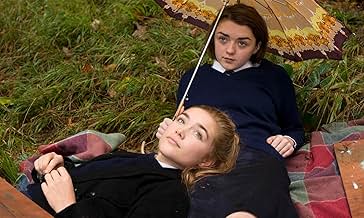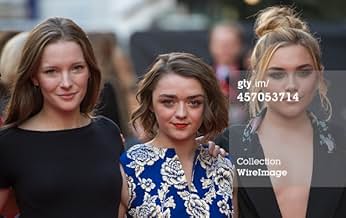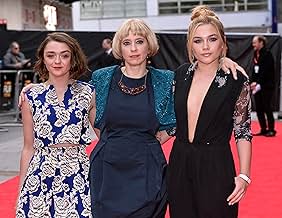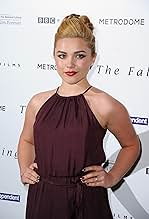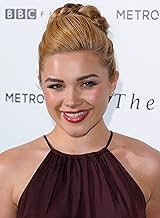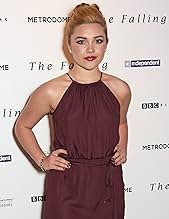Es ist 1969 an einer strengen englischen Mädchenschule, wo die charismatische Abbie und die leidenschaftliche und unruhige Lydia beste Freundinnen sind. Nach einer Tragödie in der Schule mac... Alles lesenEs ist 1969 an einer strengen englischen Mädchenschule, wo die charismatische Abbie und die leidenschaftliche und unruhige Lydia beste Freundinnen sind. Nach einer Tragödie in der Schule macht sich eine mysteriöse Ohnmacht breit.Es ist 1969 an einer strengen englischen Mädchenschule, wo die charismatische Abbie und die leidenschaftliche und unruhige Lydia beste Freundinnen sind. Nach einer Tragödie in der Schule macht sich eine mysteriöse Ohnmacht breit.
- Auszeichnungen
- 3 Gewinne & 5 Nominierungen insgesamt
- Titch
- (as Rose Caton)
Empfohlene Bewertungen
5.3/10
Unfortunately, the storyline of THE FALLING is all over the place. For the first half hour it's a typical tale of teenage angst and friendship. Things take a darker turn with the introduction of incestuous sub-plots and the like, but then they become ridiculous with the well-choreographed fainting spells. Subliminal imagery abounds, alongside some hinted-at supernatural aspects, but it all adds up to far less than the sum of its components. What's the message here, anyway? What's it all about?
I previously saw director Carol Morley's docu-drama DREAMS OF A LIFE and that was a similar film in that it had an interesting premise but sub-standard execution. Plus, Morley doesn't seem to be very assured at getting good performances out of her actors, and the acting is of a distinctly wishy-washy standard here. I love Maisie Williams in GAME OF THRONES, but she seems unsure of herself here and sometimes just feels like Arya in a school uniform.
A psychological contagion enabling the exploration of sexuality, moulded by misty melodrama against an autumnal period backdrop. Disturbingly beguiling in nature, through metaphorical body possessions that highlight supernatural elements within the obtrusive sexual motives. Morley, for the most part, captivates when allowing her acting talent to shine through. An innocently naive Williams bravely controlling every scene in her leading role as a psychologically deterred student whom seemingly is a catalyst for the hysteria breakouts. Hospitalised, psychoanalysed and actively withdrawn from therapy, the spells of hysteria are never elaborated. An unexplainable mass psychogenic illness. Morley's intent in ambiguity enables her ostentatious narrative to visualise sexualisation. Hormonal chemicals invading the bloodstream and controlling the mind. A possession, if you will.
Conversely, her screenplay resorts to ethereal poetry and psychedelic narration, emphasising the connectivity between these girls. Unfortunately, several conversational scenes spoon-feed proposed metaphors for the assurance of acknowledgement, most notably the one-sided therapy session that Lydia and her friends endure. Diminishing the bold interpretations that preceded the conclusive act almost indefinitely.
Then the final ten minutes commence and Morley outwardly encounters her own spell of hysteria. The tone alters. The mood unequivocally changes. The pace quickens. She dabbles into darker subjects, a territory that heavily contrasts with the predominantly mystifying narrative. The virginal Lydia interrogating her neglectful agoraphobic mother regarding her father, whilst developing an incestuous relationship with her brother. Discovering her true roots, subsequently offering a hereditary reasoning for her mental instability. It's at this point where Morley loses that tight narrative control. Explicitly presenting a shallow explanation that manages to resolve familial turmoil in a matter of minutes, allowing the supernatural aura to dissipate. Not to mention how under-utilised and misdirected Peake was. Fortunately Pugh's illuminatingly perfect performance makes up for lost talent. The editing imaginatively strings various images together during rapid flashback scenes, which proved effective for the most part. Thorn's soundtrack however was too audacious and overpowering, likening The Falling to a casual summer school trip rather than an existential piece of art.
Morley is a credible director, and The Falling is one feature that uniquely tackles a variety of subjects in a mesmerisingly imaginative manner. Its fundamental issues however are situated in its inappropriate climax and misplaced technicalities that allow the narrative to repetitively faint far too often.
Alas this film, which I thought would match this from the reviews I read, did not come anywhere near it. Whereas this was certainly a personal project to writer / director, to everyone else it really is a non-sensical load of tosh. Neither eerie, classy, engaging or atmospheric.
The school group was similar to "Picnic" i.e. pretty centre of attention girl, mixed up clever girl down to fat eat a lot girl...pretty stereotypical characters.
When the fainting/shaking actually occurs, especially in the school assembly scene I'm afraid it became comical. They were obviously well drilled on how to faint.
The Director did try to convey a sense of nature at work here. For example, intimating that Abbie's spirit lingered among the old oak tree, straight through to hearing fox cries, owls hooting, even in the scenes shot in Lydia's house! Needless to say the (step)brother and (step)sister "getting it on" scenes were pretty uncomfortable. On that point was not convinced on the Mother character, especially the acting.
Major plus however, Florence Pugh, she is going to go far. A great looking girl with a distinctive voice and she can sing play guitar.
Wusstest du schon
- WissenswertesAccording to Maisie Williams, director Carol Morley instructed Maxine Peake (Eileen Lamont) to not communicate with Williams (Lydia Lamont) and to keep her distance from her, in order to replicate the lack of relationship between their characters. Morley did not tell Williams about this, which left Williams feeling disliked and upset throughout the shoot due to the way Peake was ignoring her. Williams eventually found out about it during the wrap party after shooting had ended, when Peake told her about Morley's instructions and apologized for any upset caused.
- Patzer(at around 21 mins) Abbie is stirring her pudding with her left hand. When the camera angle changes, the spoon is in her right hand and her left hand is up under her chin.
- Zitate
Lydia Lamont: I resent this idea that we're just emotional. This is real.
Psychiatrist: It's real, it has consequences, yes. What's important here is that it's real to you.
Lydia Lamont: Real to me, what does that mean? It's real to all of us. Something's seriously wrong. Why is everyone ignoring us?
- Crazy CreditsDisclaimer near the end of the credits: "Although this film was inspired by a variety of real episodes of mass psychogenic illnesses, the narrative is entirely fictional."
- VerbindungenFeatured in Film '72: Folge #44.3 (2015)
Top-Auswahl
- How long is The Falling?Powered by Alexa
Details
Box Office
- Budget
- 750.000 £ (geschätzt)
- Weltweiter Bruttoertrag
- 569.498 $
- Laufzeit1 Stunde 42 Minuten
- Farbe
- Seitenverhältnis
- 1.85 : 1
Zu dieser Seite beitragen



